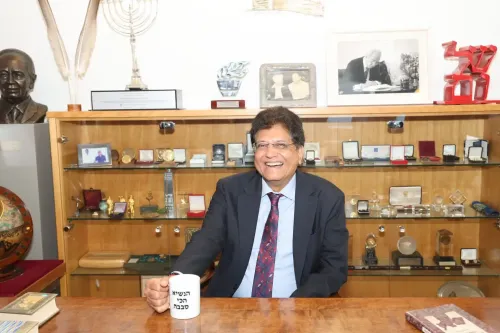Has the Cabinet Approved 4 New Semiconductor Manufacturing Units with a Rs 4,600 Crore Investment?
Synopsis
Key Takeaways
- The Union Cabinet approved four semiconductor projects with a total investment of Rs 4,600 crore.
- These projects are expected to create over 2,000 jobs.
- Facilities will be established in Odisha, Punjab, and Andhra Pradesh.
- The projects aim to strengthen India's position in the global semiconductor market.
- Manufactured products will serve various sectors, including automotive, defense, and renewable energy.
New Delhi, Aug 12 (NationPress) The Union Cabinet, led by Prime Minister Narendra Modi, has recently granted approval for four additional semiconductor projects as part of the India Semiconductor Mission (ISM), with a total investment of Rs 4,600 crore.
The approved proposals come from SiCSem, Continental Device India Private Limited (CDIL), 3D Glass Solutions Inc., and Advanced System in Package (ASIP) Technologies.
With this latest approval, the total number of projects sanctioned under the ISM has increased to 10, with cumulative investments nearing Rs 1.60 lakh crore across six states.
According to a Cabinet communique, "These four approved proposals will establish semiconductor manufacturing facilities with a total investment of approximately Rs 4,600 crore and are anticipated to create employment opportunities for 2,034 skilled professionals, significantly boosting the electronic manufacturing ecosystem and leading to the generation of numerous indirect jobs."
SiCSem and 3D Glass Solutions will be located in Odisha, while CDIL will expand its operations in Punjab, and ASIP will establish its facility in Andhra Pradesh.
SiCSem Private Limited is partnering with Clas-SiC Wafer Fab Ltd. from the UK to create an integrated facility for silicon carbide-based compound semiconductors in Info Valley, Bhubaneshwar. This will mark the first commercial compound fab in India, with plans to produce silicon carbide devices, featuring an annual capacity of 60,000 wafers and a packaging capacity of 96 million units.
The manufactured products will have various applications, including in missiles, defense equipment, electric vehicles (EVs), railways, fast chargers, data center racks, consumer appliances, and solar power inverters, as stated by the Cabinet.
3D Glass Solutions Inc. (3DGS) aims to establish a vertically integrated advanced packaging and embedded glass substrate unit in Odisha, introducing cutting-edge packaging technology to India.
This facility will encompass a diverse range of advanced technologies, including glass interposers with passives and silicon bridges, alongside 3D heterogeneous integration (3DHI) modules. The expected capacity for this unit is about 69,600 glass panel substrates, 50 million assembled units, and 13,200 3DHI modules annually.
The products are set to serve critical roles in defense, high-performance computing, artificial intelligence, RF and automotive sectors, photonics, and co-packaged optics, according to the Cabinet.
Furthermore, Advanced System in Package Technologies (ASIP) will establish a semiconductor manufacturing unit in Andhra Pradesh, collaborating with APACT Co. Ltd from South Korea, boasting an annual capacity of 96 million units. The products manufactured here will cater to mobile phones, set-top boxes, automotive applications, and various electronic devices.
Continental Device (CDIL) plans to expand its discrete semiconductor manufacturing facility in Mohali, Punjab. This new facility will produce high-power discrete semiconductor devices such as MOSFETs, IGBTs, Schottky Bypass Diodes, and transistors fabricated from both silicon and silicon carbide.
The expected capacity from this brownfield expansion is around 158.38 million units. The devices produced are intended for automotive electronics, including EVs and their associated charging infrastructure, renewable energy systems, power conversion applications, industrial uses, and communication infrastructure.
According to the Cabinet, "These initiatives will complement the burgeoning world-class chip design capabilities emerging in the country, supported by the government’s design infrastructure backing for 278 academic institutions and 72 start-ups. Over 60,000 students have already benefited from this talent development program."









